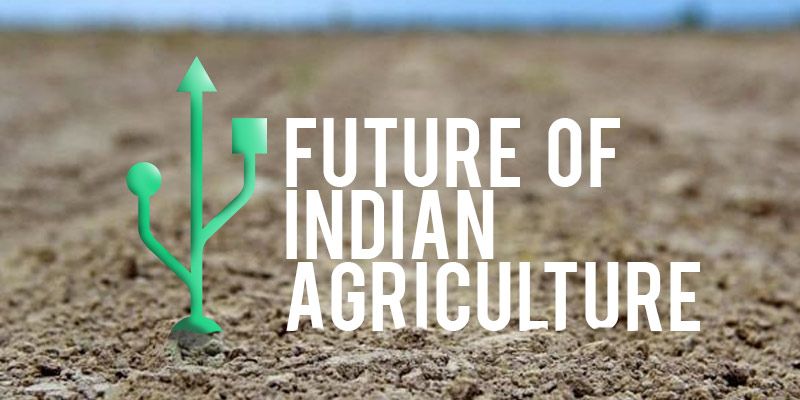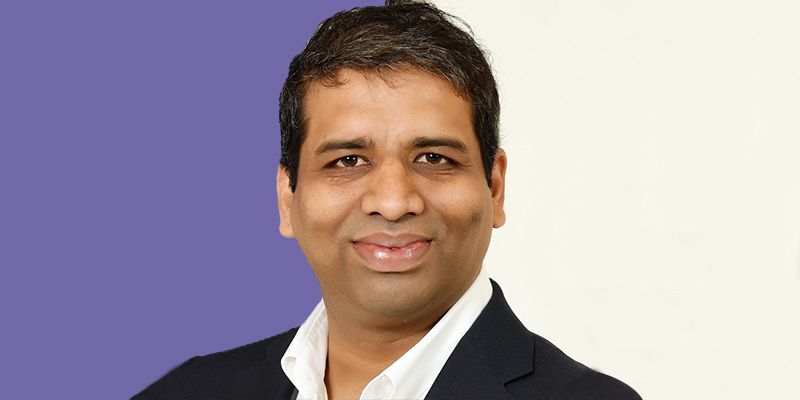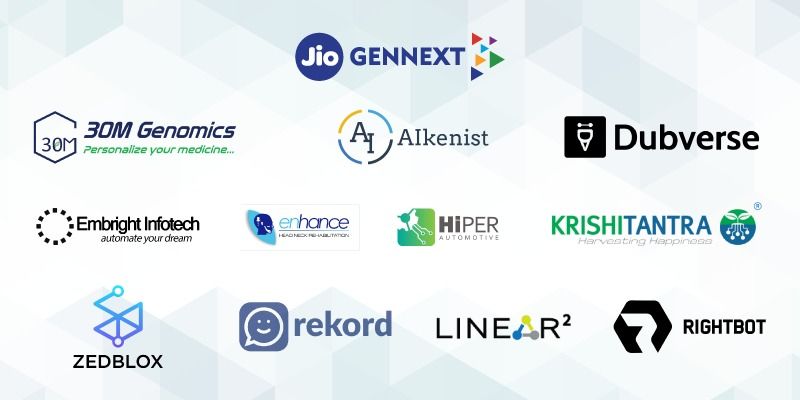What is the future of Indian agriculture? A farmer, an investor and an entrepreneur tell us
Agricultural population of India grew by a whopping 50 per cent between 1980 and 2011, the highest for any country during this period. While we are still waiting for the second green revolution, many entrepreneurs have already started exploring the huge opportunities in the agricultural space.
The recent Vodafone Agriculture Meetup by YourStory witnessed some great innovations from the agri-tech sector. The panel discussion at the meetup had all stakeholders of agriculture sharing their opinions, knowledge and experiences with the farmers, entrepreneurs and other audience. Panelist included Reihem Roy, VP – Omnivore Partners; Vinay Kumar, COO – Digital Green; Vijay Pratap Singh Aditya, Founder – Ekgaon, and M Narayana Reddy, a progressive farmer from Doddaballapur.
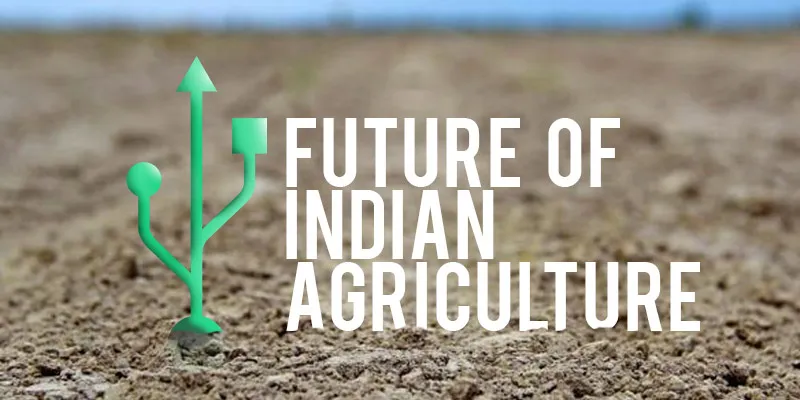
In short, there was a technology enabled solutions provider, an NGO working with government organization, an investor who certainly knows what makes money in agriculture and an aware farmer who has been cultivating his four acres of land using the most effective and advanced methods.
Karthik from Vodafone Developers program moderated the panel and started with something which matters the most to sustain, money. “Why will a corporate indulge in agriculture? Is it CSR or is there some real money to be made?” There was anguish, experience, doubt, interest and hope clearly visible in the discussion. Here’s a brief review of the panel discussion.
“In last 15 years, over 2.5 million farmers have committed suicide and not one of them was practicing organic farming.”
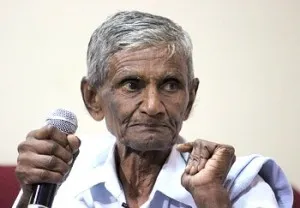
Dressed in a white half-shirt and a white dhoti with leather chappals, Mr Narayana Reddy’s comment displayed the sheer experience of his 42 years in this sector. He described agriculture as the way of existence and supporting the family but unfortunately, all across the world people are cultivating for exports using chemical fertilizers. He said, “Agriculture is not a profession which requires inputs from outside. During the last 15 years in India, we are totally dependent on external inputs. As a result, more than 2.5 lakh farmers have committed suicide. Until we make our own manure and contribute 30-40% of employment (via agriculture) we are not going to make agriculture sustainable. We are not only seeing stagnation in agriculture but a deep decline in the last three decades. Taking away the land from farmers in the name of industrialization is not a good sign for the future. An integrated system of small farms is a sustainable practice.”Narayana Reddy also operates a training centre at his village and can demonstrate to any scientist that their recommendation of using chemical fertilizers is a myth. He mentioned that there is always shying away from sharing knowledge like nitrogen fixation which is responsible for converting atmospheric nitrogen to ammonia in presence of lightning. He added rather boastfully, “In my four acres of land, I grow 20 tonnes of sapota, 6000 coconuts, 10 tonnes papaya, seven to eight tonnes banana, 20 tonnes of vegetables.”
He also shared his disappointment with the inaccuracy of weather forecasting. On a lighter note he said, “It rains when chickens spread their wings and run, when the north east winds blow, when ants carry their eggs towards high altitudes, but not when the weather forecast says so.”
“We have been able to reduce the input cost for a farmer to INR 530/acre saving INR 1000-2000/acre”
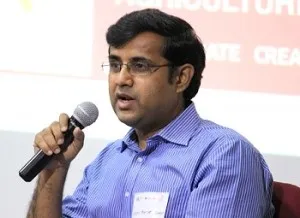
Vijay Pratap Singh Aditya of Ekgaon understands the anguish of farmers. He said, “80% of farm subsidies go to chemical companies which are owned by politicians. Unfortunately, the knowledge of organic farming is getting lost with time. There are challenges in infrastructure and technology support as well. To combat these pertaining issues, Ekgaon used mobile phones to provide tailored farm advisory services to farmers depending on their farm size, geography, crop, soil etc.”Ekgaon takes inputs like soil data, crop variety, productivity and nutrients loss in soil to come up with appropriate advice on what amount of fertilizer to be put (chemical) in the farm, what/where/how to apply the pesticide, including the contact details of nearest dealer of the same. Regular reminders are sent to check on the implementation status of the advice. They work on real time data sets and claim to have reduced the input cost to INR 530 per acre i.e. saving INR 1000-2000 per acre.
Ekgaon aims to reach five million farmers with their current database of 100 varieties of crops to go up to 1500.
“If Ferrari and Lamborghini can have the foresight of reworking on the ground clearance before launching in India , so can entrepreneurs in agriculture.”

Reihem Roy, VP – Omnivore Partners, spoke about the importance of context. “A website serving the needs of a farmer in TN which is designed using the data from the Gangetic planes is not wrong, it’s just not appropriate. Calling technology wrong and calling it inappropriate are very different things. Getting it right happens with a period of time, getting it appropriate happen at the outset.”He further added, “Similarly, mechanization and automation is wrong only when it’s done wrong. There is abundant technology available for farmers but it is not appropriate and applicable for this stage of Indian agriculture. This in turn creates an opportunity for entrepreneurs. For example, the current technology from GE is designed for large farms and to support 500 cows. How to apply that technology for small farms with only two cows is still missing.”
Reihem is extremely hopeful about the future of agri-tech in India. He said, “The world is an oyster in terms of opportunity. Either you can moan and groan or choose to take it up and build solutions. It’s your choice.”
On a lighter note, he said, “You don’t have to reinvent the wheel, simply take the wheel and put it in the Cloud. If Ferrari and Lamborghini can have the foresight of reworking on the ground clearance before launching in India, so can entrepreneurs in agriculture.”
“Before suggesting solutions for farmers, take out some time to work with them and understand their needs.”
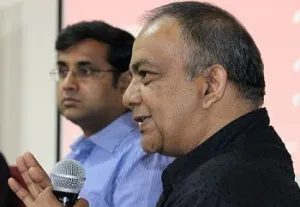
Digital Green is an online platform that leverages Information and Communication Technology (ICT) and cutting-edge technological tools to reach out to small and marginal farmers. They create capacity among community groups and farmers to produce videos on topics that are relevant to local farmers, featuring farmers as actors.Vinay Kumar, COO of the organization, said, “While most of our work is about technology, we first work with farmers trying to understand their needs. Then only we proceed with making tools and providing technology solutions for them. Today, we cannot negate any technology or new innovation. It is very important that we look for the right kind of partners to work with. Working with communities is always a great experience and their input adds to the defensibility of the solutions. Self Help Groups are the real catalysts to the social change and their involvement is helpful in reaching out to a larger audience.”
Technology has enabled everything around and about us but somewhere the lack of interest of technologists in agriculture has been a setback. There is a big opportunity for entrepreneurs in the field of automation, Cloud integration and communication. Solutions have to be customized to suit the local needs and one has to be patient to see the outcomes. It’ll take time but eventually agri-tech will pick up and be among the top interest groups for startups.
What do you think? Do comment.






